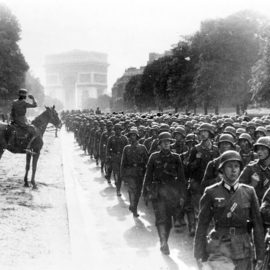

This article is an excerpt from the Shortform book guide to "The Ride of a Lifetime" by Bob Iger. Shortform has the world's best summaries and analyses of books you should be reading.
Like this article? Sign up for a free trial here .
How did the ABC Capital Cities acquisition happen? How did this affect Bob Iger’s career?
In 1985, ABC was acquired by Capital Cities Communications for $3.5 billion. The ABC Capital Cities acquisition had a huge impact on young Bob Iger’s career because it introduced him to him Tom Murphy and Dan Burke, who became his role models for good management.
Keep reading to learn about the ABC Capital Cities acquisition and how it changed Bob Iger’s life.
Bob Iger’s Career Beginnings
After college, Bob Iger (now former Disney CEO) worked for a year as a reporter and weatherman for a small Ithaca TV station. He’d once dreamed of becoming a big-time news anchorman, but his mediocrity at the job and the unclear path upward convinced him to try something else.
In 1973, at 23, he moved to Manhattan and got a job as a studio supervisor at ABC. It paid $150 per week and was the very bottom of the totem pole. His job was to do anything needed to get shows ready for airing, including showing up at 4:30 AM to let the stagehands onto the set, checking on catering, and keeping the staff happy however he could.
This was a pivotal experience for Bob Iger’s career. He learned how shows of all kinds were made, from soap operas to news shows to game shows. He learned to work with all kinds of television staff, from makeup artists to electricians to carpenters. Most importantly, the grueling hours and workload developed a flinty work ethic that stays with him today.
Iger’s run in the department ended when he clashed with his boss. Iger’s boss was corrupt and used company resources for himself and his mistress. Iger asked other people what he could do about it, and his boss accused him of spreading rumors. In an argument, Iger was told to transfer to another department or lose his job.
Iger moved to ABC Sports as a studio operations supervisor, which in retrospect turned out to be a lucky break.
The ABC Sports Culture
Since ABC Sports was a star division in the company, people who worked there earned special treatment. They had expensive clothes and tastes, they associated with Hollywood celebrities and sports royalty, and they jetset around the world to cover sports in exotic places.
The travel broadened Iger’s worldview, giving him both his first refined French meal and his exposure to the daily struggles of people in the Soviet Union. At the same time, he was aware of how relatively unsophisticated and uneducated he was compared to his co-workers, and this drove him to the one place he knew he could win—work harder than anyone else.
ABC Capital Cities
In 1985, Bob was 34 years old and, after spending 12 years at ABC, was vice president at ABC Sports. That year, ABC was acquired by a company called Capital Cities Communication for $3.5 billion. This was an acquisition where a minnow swallowed a whale—ABC was four times as large as Capital Cities.
Capital Cities was run by two savvy business operators, Tom Murphy and Dan Burke. The company had begun as a single TV station in Albany. Over time, they acquired station after station until they had assembled a large portfolio of TV stations, radio stations, and newspapers.
Their consistent strategy was to find a new TV station and increase profits by 1) investing in programming to raise revenue, and 2) cutting unnecessary costs. They’d then use the profits to acquire more stations.
Tom and Dan immediately went to work making changes at ABC Capital Cities. First they clamped down on perks, like executive limos and first-class flights. While some executives complained about the penny-pinching, in retrospect this was the right strategy—competition was getting tougher, and margins were slimmer; to survive, they’d need to be smart about their spending.
Humble Values for ABC Capital Cities
Despite their operational shrewdness, Tom and Dan were folksy, down-to-earth people. Unlike the hotshots at ABC Sports, Tom and Dan didn’t have deep connections to Hollywood and talked about humble values. To ABC Capital Cities executives, they seemed like country rubes. In reality, they simply cared about operating good businesses and wanted little of the glamour.
To Bob Iger, ABC Capital Cities owners Tom and Dan embodied strong, admirable values:
- They were consistently authentic with low egos. They gave their time generously and wanted to help whoever needed it.
- They were respectful and empathetic to their staff. They didn’t pay as much as the competition, but their respect was earnest, and that earned people’s trust.
- They had strong integrity. They knew what was right and wrong, and they operated by that instinct.
- They believed in decentralization. Instead of having a central corporate headquarters that controlled every decision, they put smart people at the head of business units and gave them autonomy.
- When choosing who to promote, they chose intelligence and ability over experience. They trusted that smart people without experience would be able to figure out the job on the fly, and the unfamiliarity would push them to improve more than they thought possible.
Over time, Tom and Dan’s humble values spread throughout ABC Capital Cities and transformed its culture.

———End of Preview———
Like what you just read? Read the rest of the world's best book summary and analysis of Bob Iger's "The Ride of a Lifetime" at Shortform .
Here's what you'll find in our full The Ride of a Lifetime summary :
- How Bob Iger went from television crew member to CEO of Disney
- The 10 major principles behind Iger's management style and success
- How Iger resuscitated Disney Animation by buying Pixar






